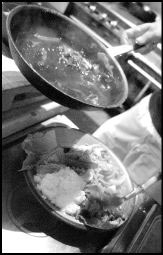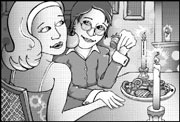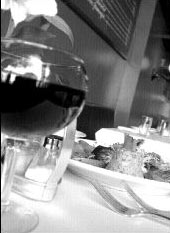EN SEATTLE 2429 Second, 770-0250 lunch Mon.-Fri., dinner Mon.-Sat.
Japanese cuisine is both delicate and powerful, like the culture that created it. Famous for haiku and shiny anime robot heroes, Japan is all about deceptively simple perfection. A single square of tofu, garnished with three droplets of sauce and a circle of scallion, resting on a plate precisely calibrated for the starkly ideal presentation of bean curd—this could only arise from a people obsessed with refined beauty.
Traditional American food, like many traditional Americans, is bland and big. Portion size is forced to go a long way to compensate for lack of flavor, and the dual role of food as medicine and as luxury results in an unhealthy vacillation between the stone-ground kernels of crunchy nutrition and the creamy sarcophagus of cholesterol-laden comfort. The Japanese, with their rocky, untillable islands, have never known the embarrassment of riches that resulted in all-you-can-eat buffets. What most Americans consider inedible—poisonous fish, fermented soybeans—are treated as either great delicacies (fugu) or staples (natto). The U.S. is concerned with making foods that are easy to ship. The Japanese are concerned with making foods with sappori, defined as both “clean and light” and “sparkling with honesty.” When American food sparkles, it’s from sugar crystals.
Stumbling upon En Seattle, you assume you’ve found yet another sushi bar in Belltown, as big an accomplishment as finding an SUV in Issaquah. En, which translates as “destiny,” is dark and cool, exactly the way you want an evening in Belltown to shape up. Your eyes roam over tasteful bamboo mats and delicate paper collages until they are frozen by the sight of an earnest, possibly hungover monkey holding a sign proclaiming “Asian Homemade Style.” Japanese food that’s not sushi? You request a table.
You ask your server about sake, and in the midst of a glorious if slightly muddled educational experience, you discover you are talking to the owner, Wei Fu. It is his destiny to be the most informative, humble, and charming owner in all of Belltown. You are told, “Cold sake, good. Hot sake, bad,” and are shortly presented with a lovely unglazed jug and wee matching cup. You see only the monkey and breathe deeply. Sip. It’s a revelation. Melon, bananas, tartness, a high alcohol content. Cold sake is indeed good.
Trusting the fates that have honored you thus far, you order toriyakko ($4.25) and kushiage ($5.75). The first explains how tofu could ever have become such a dietary staple; it is firm, creamy, and cold, the perfect little protein custard to balance the fresh oniony sauce and tender shreds of chicken. Kushiage is remarkably similar to tempura, and includes lightly battered asparagus, sweet potatoes, chicken, and zucchini. The sauce is smooth, dark, and spicy; a mystery. You sip the sake again, and see that sappori sparkles with more than honesty—it sparkles with balanced textures, with purely defined flavors, with the clarity of Mount Fuji at sunrise.
Wei brings a new set of delights. You ordered En Chicken ($9.25), as you found the idea of a chicken of destiny to be irresistible. A simple combination of crunchy celery slices, thinly batter-dipped bird, and assorted mushrooms, the peppery green freshness soars above the earthy tenderness of both chicken and fungus, like a swallow flying over a bog. The tonkatsu ($9.95) comes very, very close to feeling American, but veers back to Japan in the details. What at first glance appears to be mashed potatoes is in fact a cool, creamed potato salad—lightly mashed, blended with butter, and drizzled with a tart, creamy sauce and sesame seeds, this is a salad that makes you question your every potato assumption. You pause to smack your companion’s chopsticks away as they make off with another slice of crispy breaded pork tonkatsu. You hurry to eat the last of the chop before it is stolen, newly appreciating the sharp points on Japanese chopsticks and beginning to strategize your defense of dessert.
Alas, your diabolically clever plans are destined for naught. Mochi ice cream buns ($3.25) are too adorable to lead to violence. Small squares of ice cream (chocolate, vanilla, mango, or green tea) are wrapped in the softest cloud of rice pastry imaginable. You want to make friends, and stroke one with a timid finger. It does not bite, but neither does it purr. You wish you could carry one in your pocket but realize that the destiny of ice cream is to be eaten. You proceed to make its little ice-cream dreams come true.
It is America’s destiny to appropriate the consumable parts of other cultures, such as lunch and dinner. Before stumbling back out into the great world, you thank Wei profusely, if incoherently, for contributing to this appropriation in such a way that Westerners can have a Japanese experience that doesn’t involve passports or raw fish. He seems sincerely delighted that you dined with him and his hung-over monkey sign. He hopes you will return. You feel sure that it is written in the stars.









